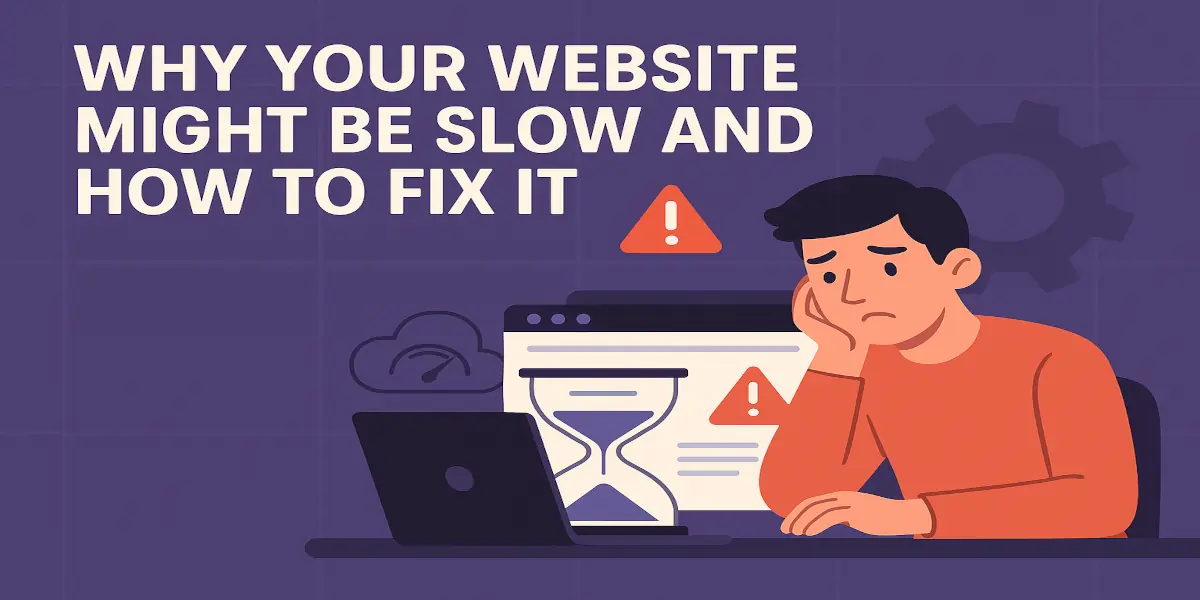A slow-loading website can frustrate visitors, hurt your search engine rankings, and reduce conversions. While there are many potential causes for sluggish performance, hosting-related issues are often the primary culprits.
In this article, we’ll diagnose common hosting problems that slow down websites and provide actionable solutions to speed them up.
Problem:
If your website is on a shared hosting plan, you’re sharing server resources (CPU, RAM, bandwidth) with other websites. If one site experiences a traffic spike, it can slow down everyone else on the same server.
Solution:
Problem:
If your web host’s servers are far from your visitors, latency increases, leading to slower load times.
Solution:
Problem:
Older PHP versions (e.g., PHP 7.x or below) are slower and less secure than newer releases (PHP 8.0+).
Solution:
Problem:
Without caching, your server generates pages from scratch for every visitor, increasing load times.
Solution:
Problem:
Over time, databases accumulate unnecessary data (spam comments, post revisions, transient options), slowing down queries.
Solution:
Problem:
If your hosting plan has low CPU or RAM limits, your site may slow down under traffic spikes.
Solution:
Problem:
If your DNS provider is slow, visitors experience delays before your site even starts loading.
Solution:
Problem:
Too many scripts, images, or unoptimized media files can bog down your site.
Solution:
A slow website is often a hosting-related issue, but the fixes are usually straightforward. Start by:
✅ Upgrading your hosting plan if needed.
✅ Enabling caching (server & browser).
✅ Optimizing images & databases.
✅ Using a CDN for global speed boosts.
By addressing these common problems, you can significantly improve your website’s performance—keeping visitors happy and improving SEO rankings.
Need help? Consider performance audits or switching to a faster hosting provider to ensure optimal speed. 🚀
In this article, we’ll diagnose common hosting problems that slow down websites and provide actionable solutions to speed them up.
1. Overloaded Shared Hosting
Problem:
If your website is on a shared hosting plan, you’re sharing server resources (CPU, RAM, bandwidth) with other websites. If one site experiences a traffic spike, it can slow down everyone else on the same server.
Solution:
- Upgrade to a better hosting plan (VPS, dedicated, or cloud hosting).
- Use a managed WordPress host if you run a WordPress site.
- Consider LiteSpeed or Nginx hosting, which offers better performance than traditional Apache servers.
2. Poor Server Location
Problem:
If your web host’s servers are far from your visitors, latency increases, leading to slower load times.
Solution:
- Choose a host with data centers near your target audience (e.g., US, Europe, or Asia-optimized servers).
- Use a Content Delivery Network (CDN) like Cloudflare or BunnyCDN to serve content from global edge servers.
3. Outdated PHP Version
Problem:
Older PHP versions (e.g., PHP 7.x or below) are slower and less secure than newer releases (PHP 8.0+).
Solution:
- Check your hosting control panel and upgrade to the latest stable PHP version.
- Test your site afterward to ensure compatibility.
4. Lack of Caching
Problem:
Without caching, your server generates pages from scratch for every visitor, increasing load times.
Solution:
- Enable server-level caching (OPcache, Redis, Memcached).
- Use plugin-based caching (WP Rocket for WordPress, Cache Enabler).
- Leverage browser caching via .htaccess or a CDN.
5. Unoptimized Database
Problem:
Over time, databases accumulate unnecessary data (spam comments, post revisions, transient options), slowing down queries.
Solution:
- Clean your database (use plugins like WP-Optimize for WordPress).
- Optimize tables via phpMyAdmin or a hosting tool.
- Schedule regular database maintenance.
6. Limited Server Resources (CPU/RAM)
Problem:
If your hosting plan has low CPU or RAM limits, your site may slow down under traffic spikes.
Solution:
- Monitor resource usage.
- Upgrade to a higher-tier plan if you frequently hit resource limits.
- Optimize code and plugins to reduce server load.
7. Slow DNS Lookups
Problem:
If your DNS provider is slow, visitors experience delays before your site even starts loading.
Solution:
- Use a fast DNS provider like Bunny DNS, Cloudflare DNS, Google DNS.
- Reduce DNS lookup times by minimizing external dependencies.
8. Excessive HTTP Requests & Large Files
Problem:
Too many scripts, images, or unoptimized media files can bog down your site.
Solution:
- Compress images (use WebP format, TinyPNG, or ShortPixel).
- Minify CSS/JS files (via Autoptimize or manually).
- Defer non-critical JavaScript to load after page rendering.
Final Thoughts
A slow website is often a hosting-related issue, but the fixes are usually straightforward. Start by:
✅ Upgrading your hosting plan if needed.
✅ Enabling caching (server & browser).
✅ Optimizing images & databases.
✅ Using a CDN for global speed boosts.
By addressing these common problems, you can significantly improve your website’s performance—keeping visitors happy and improving SEO rankings.
Need help? Consider performance audits or switching to a faster hosting provider to ensure optimal speed. 🚀

